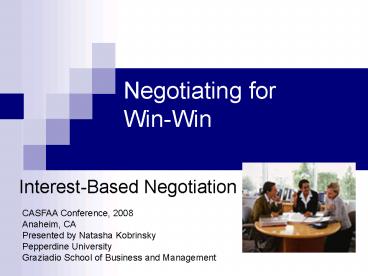Negotiating for WinWin - PowerPoint PPT Presentation
1 / 29
Title:
Negotiating for WinWin
Description:
Presented by Natasha Kobrinsky. Pepperdine University ... Enhance your negotiation skills by using the interest-based approach and mediation techniques ... – PowerPoint PPT presentation
Number of Views:72
Avg rating:3.0/5.0
Title: Negotiating for WinWin
1
Negotiating for Win-Win
Interest-Based Negotiation
CASFAA Conference, 2008 Anaheim, CA Presented by
Natasha Kobrinsky Pepperdine University Graziadio
School of Business and Management
2
- Do You Negotiate?!
3
Session Objectives
- Recognize your negotiation skills
- Understand the negotiation process
- Enhance your negotiation skills by using the
interest-based approach and mediation techniques
4
What is Negotiation?
- Its a power imbalance
- Its a discussion intended to produce an
agreement - Its a process to resolve disputes
- Its a process of learning and discovery
- Its a process of bargaining for individual or
organizational advantages
5
Approaches to Negotiation
- Positions are tangible items people say they want
- Interests are the things one cares about and
wants
6
Approaches to negotiation
- Negotiations could be right-based
- Power-based
- Interests-based
7
Negotiation Outcomes
- Win-Lose
- Lose-Lose
- Win-Win
8
Criteria to compare negotiation outcomes
- Transaction cost
- Satisfaction with outcomes
- Effect on the relationship
- Recurrence of disputes
9
Interest-Based Negotiation vs. Distributive
Negotiation
- Creating a free flow of information
- Attempting to understand the Other Partys real
needs and Objectives - Searching for Solutions that meet the goals and
objectives of both sides - Crafting an outcome for mutual interests
10
Identify and define the real issues/problems
- Understand what drives the negotiation and
- What drives the negotiator
- Define the issues in a mutually acceptable way
11
Determine your and your opponents real interests
- Substantive interests- economic and financial
issues - Process interests
- Relationship interests
- Interests in principle
12
Establish your goal
- Best outcome
- Good enough outcome
- Tolerable outcome
- Get ready to compromise
13
Plan Prepare
- Determine your walk-away point (resistance point)
- Determine your BATNA and WATNA (best and worst
alternatives to negotiations )
14
Plan Prepare
- Learn about your opponents
- Their personality
- Their background, culture
- Their personal situation
- Look for precedents
15
Plan Prepare
- Determine your and your opponents strengths
- Consider your and your opponents weaknesses
- Identify the risk factor and try to remove it
- Identify the barriers and try to remove them
- Consider the impact of deadlines
16
Plan Prepare
- Develop alternative solutions
- Generate as many options packages as possible
to make the pie larger
17
Depersonalize the problem
- Separate the problem definition from the search
for solution - Build trust
- Do not use threats
- Remove emotional barriers for the opponents
- Show respect (Lack of respect triggers the
majority of legal actions)
18
Propose
- Try not to go first with an offer
- Give a reasonable offer
- Be prepared to change it
19
Propose Probe
- What if
- Why not
- What would you suggest
20
Ask Questions
- Use open-ended questions to get more information
- Use close-ended questions to force the other
party into seeing things your way - The less you say, the more you hear
21
Influence the other partys resistance point but
- Be ready to change your position
- Concession-making indicates an acknowledgement of
other party and a movement toward the others
position. - Flexibility keeps your negotiation going
22
Listen
- Use active listening techniques restate,
paraphrase other partys statements - Take notes
- Discover the other partys outcome values,
resistance point, motives and etc. - The opponents answers are the best guides
23
Make Counterproposal
- Try to increase the real or potential rewards of
a transaction for opponents - Align organizational personal incentives
- Motivation incentives will increase a chances
of making a deal
24
Trade
- Exchange terms or items
- Trade something you value less for something you
value more
25
Factors that facilitate successful interest-based
negotiation
- Some common objective or goal
- Faith in ones problem-solving ability
- Belief in the validity of ones own position and
the others perspective - Motivation
- Commitment to work together
- Trust
- Clear and accurate communication
26
Achieving closure
- Its important to know when to shut up and
reduce the agreement to written form.
27
Key steps for interest-based negotiation
- Identify and define the real issues
- Define the problem in a mutually acceptable way
for both sides - Depersonalize the problem
- Set mutual goals
- Separate a search for mutually beneficial
solutions from problem definition
28
Key steps for interest-based negotiation
- Establish trust and positive feeling that are
likely to lead to an integrative outcome - Advantages of moving beyond positions to real
interests - Learn to expend the pie by looking for
alternative solutions - Bargain for individual advantages
- Craft outcomes for mutual interests
- The best way to get what you want is to give the
opponents what they want
29
- People say YES to people they like!































